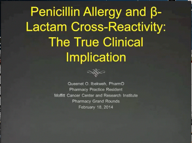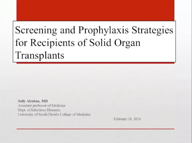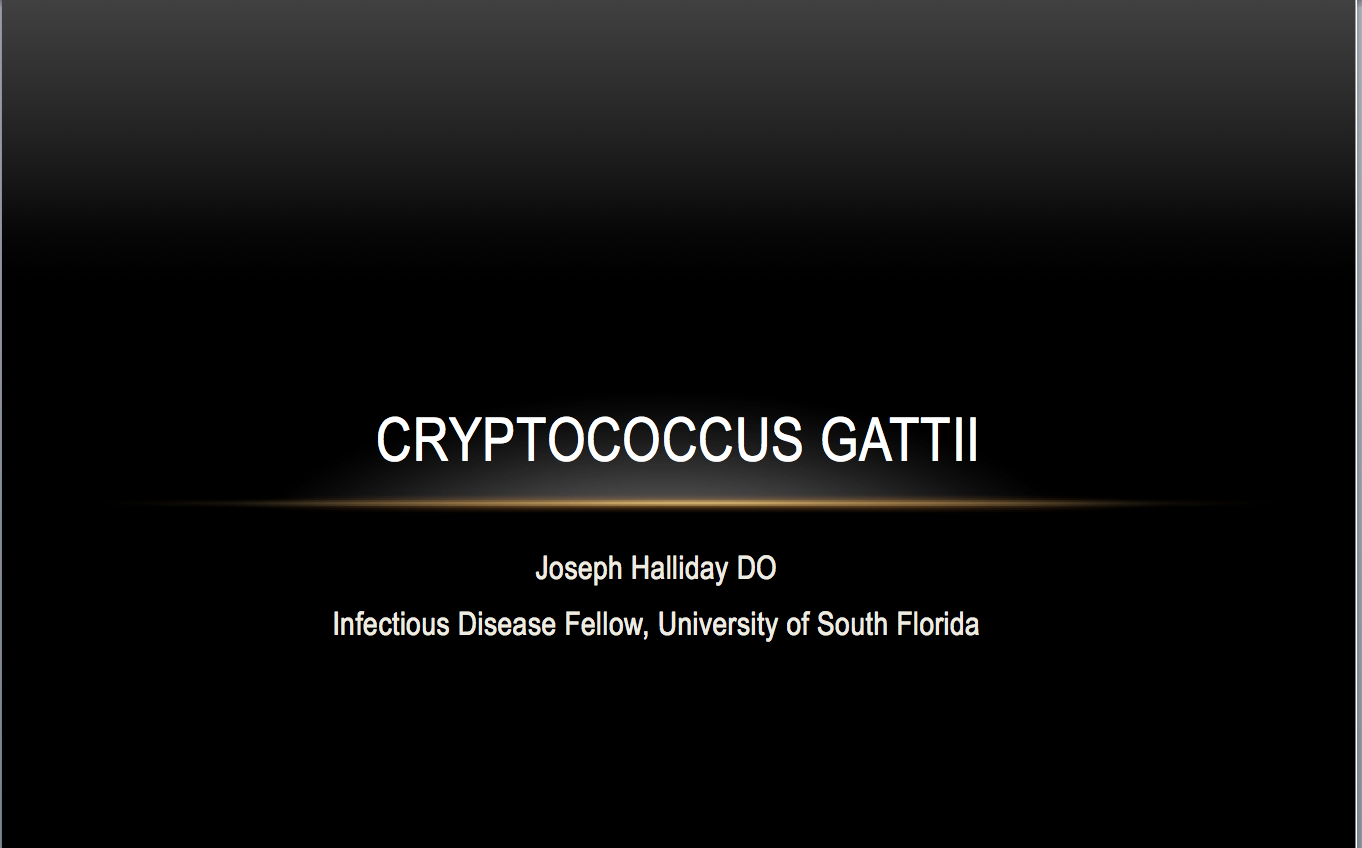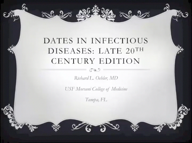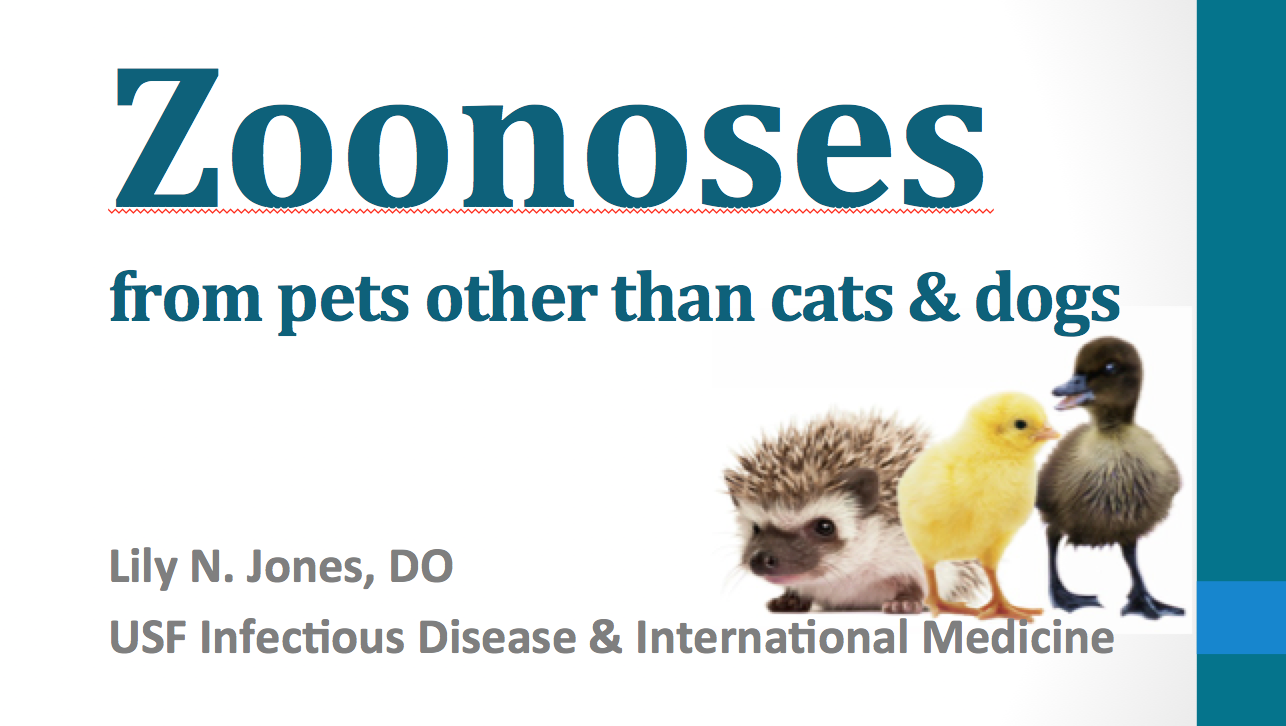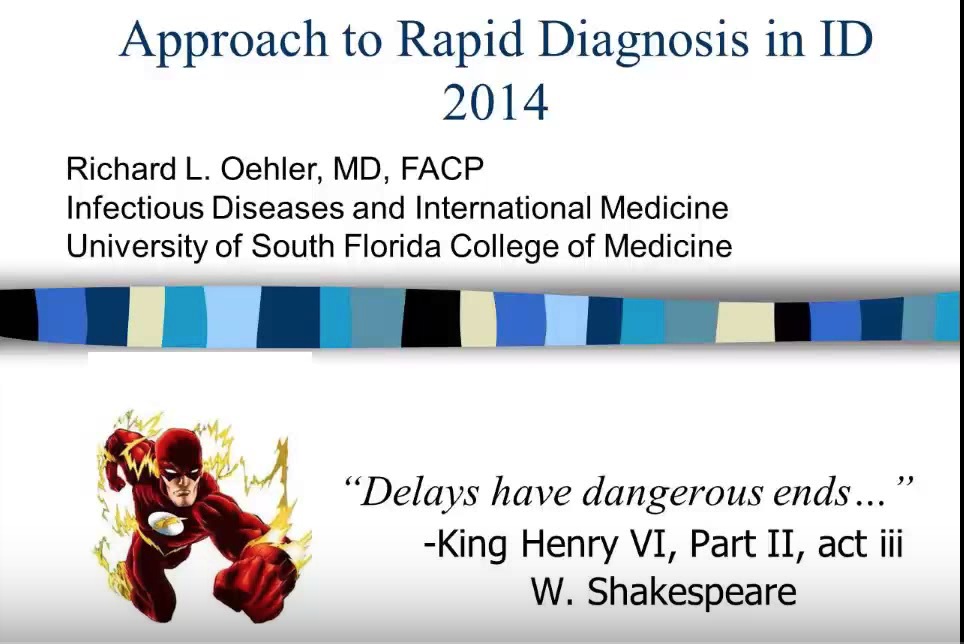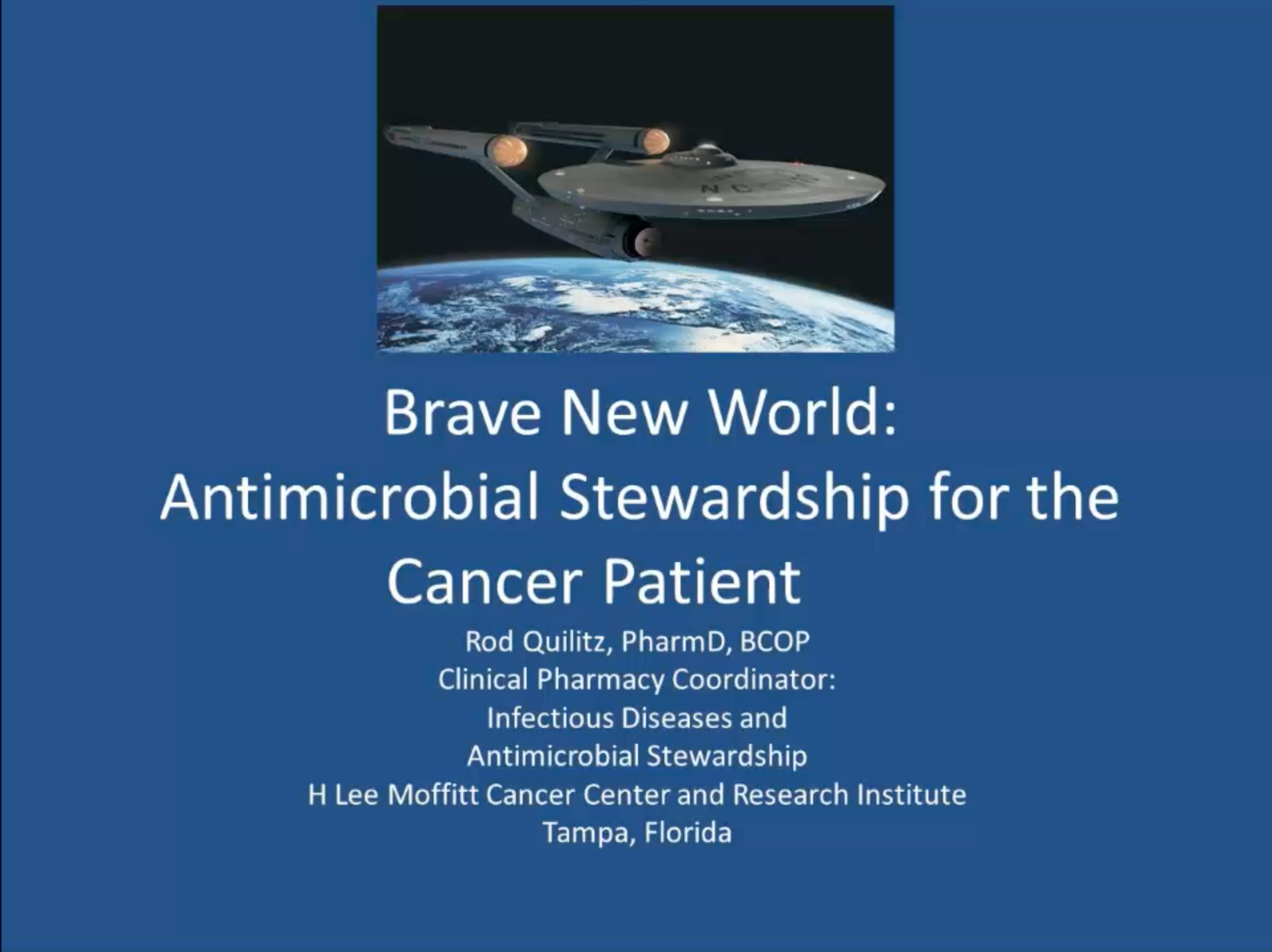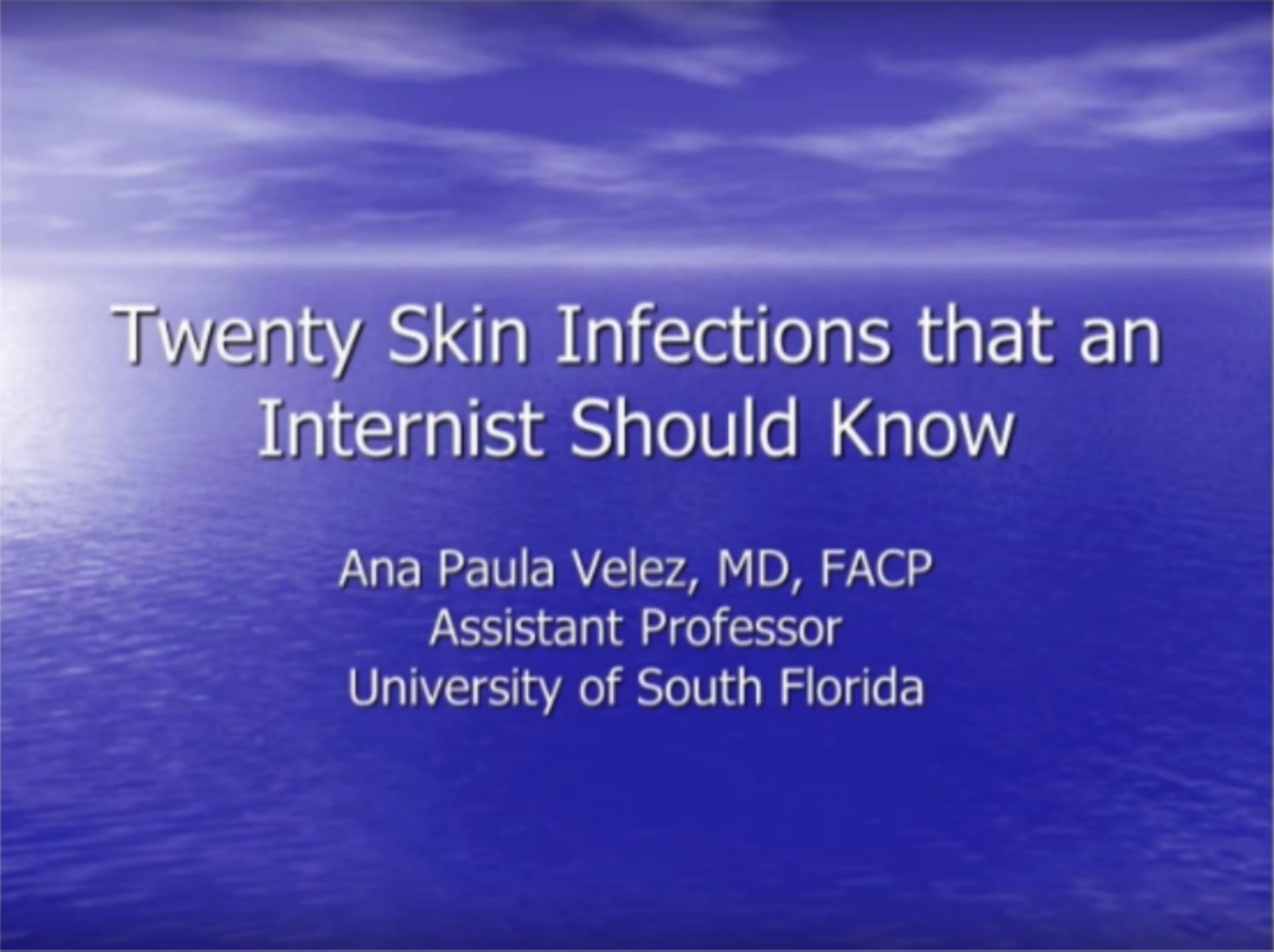Queenet Ibekweh, PharmD, speaks about the clinical implications of beta-lactam antibiotic (penicillin, carbapenem and cephalosporin) allergies. She discusses the different pathways of hypersensitivity reactions, cross-reactivity, epidemiology, pathophysiology, diagnosis, and management of penicillin induced adverse drug reactions. She also discusses the use of beta-lactam antibiotics in patients with documented penicillin allergies.
Archives
Screening and Prophylaxis Strategies for Recipients of Solid Organ Transplants
Dr. Sally Alrabaa speaks about evaluation and management of infectious diseases in recipients of solid organ transplants. Multiple studies show improved outcomes with screening and prophylaxis for infectious disease in this population, especially for opportunistic pathogens. Important screening items include history of exposures, laboratory screening for viruses, colonization with multidrug resistant bacteria and TB, and fungal and parasite screening based on geography and exposure history. She covers infectious disease contraindications to solid organ transplantation, including active TB and HIV infections. Finally, she covers prophylaxis strategies like vaccinations, peri-operative antimicrobials, and lifestyle modifications to prevent infection.
Cryptococcus Gattii
Dr. Joseph Halliday discusses an emerging fungal pathogen, C. gattii and outbreaks in the Northwest US and British Columbia. C. gattii is an encapsulated yeast most often seen in immunocompromised patients, but epidemic varieties infect immunocompetent patients as well. He also discusses the presence of endemic C. gattii, clinical manifestations of this fungal infection, diagnosis, management, and complications.
Dates in ID: 20th Century Edition
What disease caused a pandemic in 1968? When was the MMR vaccine first introduced for pediatric use? What was the Ebola virus named after? Keep watching and find out! Dr. Richard Oehler hosts an entertaining review of the history of infectious diseases in a game show format. Each question is followed by a short historical snippet to improve your knowledge of Infectious Disease trivia!
Zoonoses of Exotic Pets
Dr. Lily Jones speaks about zoonoses from exotic pets – specifically select bacterial infections and their routes of transmission. She also discusses patients who are at high risk for zoonotic infections and their prevention. She speaks about infections associated with horses, deer, sheep, cattle, goats, birds, fish, reptiles, and exotic mammalian pets. She presents specific cases studies on Q fever, Brucellosis, Leptospirosis, Typhus, and Mycobacterium marinum infections.
Rapid Diagnosis of Infectious Diseases
Dr. Richard Oehler provides an update on rapid diagnostic techniques for infectious diseases in a clinical vignette format. He discusses important signs, symptoms, and key rapid laboratory tests that can help a clinician make a rapid diagnosis and start treatment early in the disease. He also lists common pathogens and treatment strategies for each illness. He covers community acquired pneumonia, C. difficile, endocarditis, acute meningitis, necrotizing fasciitis and more!
Culture Negative Endocarditis
Dr. Mitsuya Katayama discusses a case of culture negative endocarditis. He speaks about diagnostic criteria, common pathogens, epidemiology, risk factors. Culture negative endocarditis can be associated with previous antibiotic use, fastidious bacteria, nonbacterial infection, autoimmune conditions, valvular surgery, malignancy, and underlying heart or valve disease. Dr. Katayama focuses on infectious causes of culture negative endocarditis, mainly C. burnetii and Bartonella species. He touches on fungal endocarditis and treatment strategies for different categories of patients.
Antibiotic Stewardship for the Cancer Patient
Rod Quilitz, PharmD, speaks about the conscientious use of antimicrobials in cancer patients. Cancer patients have increased risk of infections due to circumstances like neutropenia, indwelling chemotherapy catheters, breakdown of epithelium from chemotherapy, and immunosuppression. They are at risk for infections from multidrug resistant organisms as they spend more and more time in healthcare facilities. As such, Dr. Quilitz covers his experience with antimicrobial stewardship at Moffitt Cancer Center, and some guidelines on the management of infections in cancer patients.
HIV Clinic Pearls
Twenty Skin Infections for the Internist
Dr. Ana Velez speaks about common skin infections that are clinically relevant to the internist and infectious disease physician. She covers the identification of these infections, complications, and medical and surgical management, based on the depth of skin affected. She covers impetigo, erysipelas, cellulitis, fasciitis, and myonecrosis. Some infections mentioned include staphylococcal infections (including MRSA), clostridium, polymicrobial necrotizing fasciitis, Fournier’s gangrene, Pseudomonas folliculitis, and herpes zoster (shingles).
